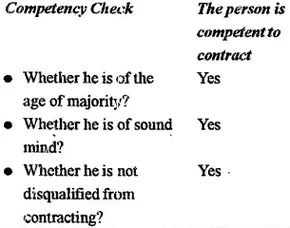Who is Competent to Contract? State the Position of Contracts with a Minor.
According to Section 11 of the Indian Contract Act, 1872, Every person is competent to contract who is of the age of majority according to the law to which he is subject, and who is of sound mind, and is not disqualified from contracting by any law to which he is subject. The three tests namely, age, soundness and disqualification need to be applied to determine whether a person is competent to contract or not. This is further summarized as follows:

According to Section 3 of the Indian Majority Act, a person is deemed to have attained majority (a) when he completes 18 years or (b) where a guardian of person or property or both has been appointed by a Court of Law ,(or where his property has passed under the superintendence of the Court of Wards), lie attains majority on completion of 21 years, According to Section 12 of the Indian Contract Act, A person is said to be of sound mind for the purpose of making a contract, if at the time when he makes it, is capable
- To understand the terms of the contract,
- To form a rational judgement as to its effect upon his interests.
A person may be disqualified from contracting if a person is not capable of both of the above is said to have suffered from unsoundness of mind. Some of the examples of persons having an unsound mind include the following:
- Idiots: A person who is permanently of unsound mind.
- Lunatic: A person who is mentally deranged due to some mental strain or other personal experience but who has some lucid intervals of sound mind.
- Drunken Persons: A sane person who is delirious from fever or who is so drunk that he cannot understand the terms of contract or form a rational judgement as to its effects on his interest.
Position of Agreements with a Minor:
As mentioned above, a minor is not competent to contract therefore, the law acts as the guardian of minors and protects their rights because they are not mature and may not posses the capacity to judge what is good and what is bad for them. Therefore, a minor is not liable for any promises made by him under an agreement.
Validity:
A contract with or by a minor is absolutely void and the minor therefore cannot bind himself by a contract. It was held by The Privy Council that a minor’s agreement is altogether void in the case of Mohan v. Rajkumar. Where Rajkumara minor borrowed from by executing a mortgage of his property in favor of Mohan.
Later on, Rajkumar sued for settling aside the mortgage. According to Section 10 and 11 of the Indian Contract Act it was held that the minor’s agreement void and therefore the mortgage were not valid. It was held that the money advanced to minor cannot be recovered because minor’s agreement was void.
Fraudulent representation by a minor:
According to Section 30 and 33 of the Specific Relief Act, 1963, in case of a fraudulent misrepresentation of his age by the minor inducing the other party to he enter into a contract, the court may provide for the compensation to the other party. As in the case of Khan v. Singh, it was held by the Lahore High Court that, where the contract is set aside, the status quo ante should be restored and the court may direct the minor on equitable grounds restore the money or the property to the other party if the money or property could be traced.
Ratification of a contract by a minor on attaining the age of majority:
A minor’s agreement is void-ab-initio therefore, an agreement with a minor cannot be ratified even after he attains majority. In the case of Ramgopal v. Sudhire, it was held that a person gave a promissory note in satisfaction of one executed by him for money borrowed when he was a minor. It was held by the court that the claim under the promissory note could note be enforced because there was no consideration.
Minor’s contract jointly with a major person:
The agreement made by a minor jointly with a major person is treated as a void contract vis-a-vis a minor however, which can be enforced against the major person who has jointly promised to perform.
Minor as a partner:
A minor cannot become a partner in a partnership firm. According to Section 30 of the Indian Partnership Act 1932, a minor may with the consent of all the partners for the time being, admitted to the benefits of the partnership. It can also be added that, he can share the profits without incurring any personal liability for losses.
Minor as an agent:
A minor can act as an agent and bind his principal by his acts without incurring any personal liability.
Minor as a shareholder:
As per the provisions of the Indian Contract Act and the Privy Council’s decision, a minor cannot become a member of the company. However, a minor can become a shareholder or member of a Company if (a) the shares are fully paid up and (b) the articles of association do not prohibit so.
Minor as an insolvent:
A minor cannot be declared insolvent because he is incapable of contracting debts, that is, he is not competent to contract.


